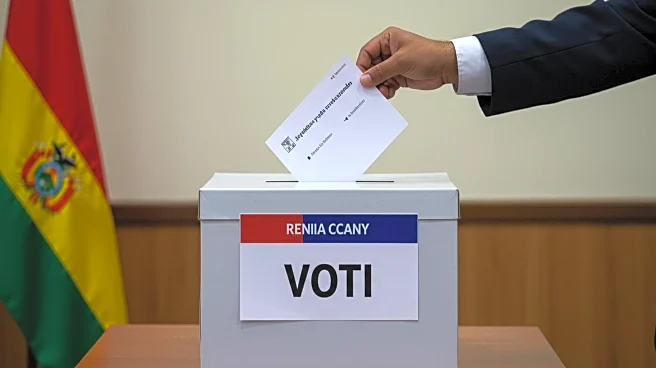What's Happening?
Bolivia is on the verge of electing its first non-left wing president in nearly two decades, following the initial round of presidential elections held on Sunday. Senator Rodrigo Paz Pereira emerged as the frontrunner, with former president Jorge Quiroga trailing in second place. Neither candidate secured a sufficient share of the vote to win outright, necessitating a run-off election scheduled for October. Paz Pereira, representing the Christian Democratic Party, surprised many by leading the polls, despite earlier predictions favoring businessman Samuel Doria Medina. His campaign has focused on decentralizing government funds, combating corruption, and promoting economic growth through accessible credit and tax incentives.
Why It's Important?
The potential shift in Bolivia's political landscape could have significant implications for its foreign policy and economic strategies. A move away from the socialist party's governance may lead to strengthened ties with the United States, contrasting the previous administration's alliances with China, Russia, and Iran. Both leading candidates advocate for increased foreign investment, particularly in Bolivia's lithium reserves, which are crucial for the production of batteries used in electric vehicles and other technologies. This election comes amid Bolivia's severe economic crisis, characterized by fuel shortages, high inflation, and debt, prompting voters to seek change.
What's Next?
The upcoming run-off election in October will determine the final outcome of Bolivia's presidential race. As the country navigates its economic challenges, the new administration will likely prioritize policies aimed at stabilizing the economy and attracting foreign investment. The shift in political power may also lead to changes in Bolivia's international relations, particularly with the United States. Observers will be watching closely to see how the new leadership addresses the economic and political divisions within the country.
Beyond the Headlines
The election highlights the deep divisions within Bolivia's political landscape, particularly within the left-wing Movimiento al Socialismo (MAS) party. Incidents of violence and public discontent during the voting process underscore the challenges facing the socialist party, which has been criticized for its handling of the economy. The election also reflects broader regional trends, as several Latin American countries experience shifts towards right-wing leadership.









